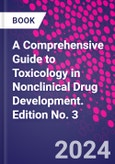A Comprehensive Guide to Toxicology in Nonclinical Drug Development, Third Edition is a valuable reference providing a complete understanding of all aspects of nonclinical toxicology in pharmaceutical research. This updated edition has been expanded and re-developed covering a wide-range of toxicological issues in small molecules and biologics. Topics include ADME in drug discovery, pharmacokinetics, toxicokinetics, formulations, and genetic toxicology testing. The book has been thoroughly updated throughout to reflect the latest scientific advances and includes new information on antiviral drugs, anti-diabetic drugs, immunotherapy, and a discussion on post-pandemic drug development challenges and opportunities. This is an essential and practical resource for all toxicologists involved in nonclinical testing in industry, academic, and regulatory settings.
Please Note: This is an On Demand product, delivery may take up to 11 working days after payment has been received.
Table of Contents
1. IntroductionSection I. Drug Discovery, Metabolism, and Pharmacokinetics
2. Critical Aspects of Integrated Nonclinical Drug Development: Concepts, Strategies, and Potential Pitfalls
3. ADME in Drug Discovery
4. Pharmacokinetics and Toxicokinetics
5. Secondary Pharmacology Screening in Drug Discovery
Section II. Toxicological Studies and Ind Application, and First In-Human Clinical Trial
6. Acute, Subacute, Subchronic, and Chronic General Toxicity Testing for Preclinical Drug Development
7. Genetic Toxicology Testing
8. Contemporary Practices in Core Safety Pharmacology Assessments
9. Preparation of a Preclinical Dossier to Support an Investigational New Drug (IND) Application and First-In-Human Clinical Trial
10. Developmental and Reproductive Toxicology
11. Juvenile Testing to Support Clinical Trials in Pediatric Population
12. Preclinical Evaluation of Carcinogenicity Using Standard-Bred and Genetically Engineered Rodent Models
13. Current Strategies for Abuse Liability Assessment of New Chemical Entities
Section III. Clinical Pathology, Histopathology, and Biomarkers
14. Clinical Pathology
15. Best Practice in Toxicological Pathology
16. Molecular Pathology: Applications in Nonclinical Drug Development
17. Biomarkers in Nonclinical Drug Development
IV. Biostatistics, Regulatory Toxicology, and Role of Study Directors
18. Biostatistics for Toxicologists
19. Regulatory Toxicology
20. Role of Study Director and Study Monitor in Drug Development Safety Studies
Section V. Specialty Route of Administration
21. Infusion Toxicology and Techniques
22. Photosafety Assessment
Section VI. Nonclinical Development of Monoclonal Antibodies, Stem Cells, Oncogenic and Non-Oncogenic Drugs, Oligonucleotides, and Vaccines
23. Preclinical Development of Monoclonal Antibodies
24. Nonclinical Safety Assessment of Cell-Based Therapies
25. Nonclinical Development of Antiviral Drugs
26. Nonclinical Assessment of Anti-diabetic drugs
27. Safety Assessments of Cancer Immunotherapy Drugs
28. Application of Micro-physiological systems to enhance drug safety assessment
29. Use of Humanized mice in Safety Assessment
30. Safety Assessment of Cell and Gene Therapy
31. Preclinical Development of Oncology Drugs
32. Preclinical Toxicology of Vaccines
33. Overview of the Nonclinical Development Strategies and Class-Effects of Oligonucleotide-Based Therapeutics
Section VII. Safety Evaluation of Ocular Drugs, Botanical Products, and Medicinal Devices
34. Safety Evaluation of Ocular Drugs
35. Safety Assessment of Targeted Protein Degraders (TBD)
36. Biocompatibility Evaluation of Medical Devices
Section VIII. Predictive Toxicology, Toxicometabolomics, Toxicogenomics, and Imaging
37. Application of Evolving Computational and Biological Platforms for Chemical Safety Assessment
38. Use of Imaging for Preclinical Evaluation
39. Drug Development Challenges and Opportunities Post-Pandemic
Authors
Ali S. Faqi ASF Scientific Solutions, Portage, MI, USA.Ali Said Faqi, DVM, PhD, DABT, ATS, is a Senior Director of Developmental and Reproductive Toxicology, a Senior Principal Scientist at MPI Research and an Adjunct Associate Professor at Wayne State University, School of Medicine, Department of OBGYN in Detroit, MI. He received his Ph.D. from the University of Leipzig in Germany in 1995 and D.V.M. from Somali National University. Dr. Faqi earned a diploma of specialization in Experimental Pharmacology from the University of Milan in Italy.
He was a postdoctoral fellow at the Institute of Clinical Pharmacology and Toxicology at the Free University of Berlin-Germany from 1996 till 1998. He worked as a Research Associate at Morehouse School of Medicine in Atlanta, Georgia and at Thomas Jefferson University in Philadelphia, Pennsylvania. Before joining MPI Research, Dr. Faqi was a Senior Scientist at Allergan Pharmaceuticals in Irvine, California and a Research Toxicologist at IIT Research Institute in Chicago, Illinois. He is a Diplomate of American Board of Toxicology (D.A.B.T.) and a Fellow of Academy of Toxicological Sciences (A.T.S.). Dr. Faqi is a member of the Editorial Board of Reproductive Toxicology Journal and ISRN Toxicology. He served as a Board of Scientific Counselors (BOSC) Computational Toxicology at the United States Environmental Protection Agency (US EPA) from September, 2009-September, 2010. He is also a member of Scientific Advisory Board of the Alzheimer's Art Quilt Initiative (AAQI).
Dr. Ali Faqi is ad-hoc scientific reviewer for the scientific journals (Regulatory Pharmacology and Toxicology, Toxicology Journal, System Biology in Reproductive Medicine, Pesticide Biochemistry and Physiology, PLoS ONE and Birth Defects Research Part B: Developmental & Reproductive Toxicology). He is a Visiting Professor at the University of Palermo, Italy. In 2009, Dr. Faqi was a guest speaker at King Fahd Medical Research Center in King Abdiaziz University, Jeddah (Saudi Arabia) where he lectured on Preclinical Toxicology.
He is a past chairman of the membership committee of the Teratology Society and a past President of Michigan Society of Toxicology. Currently, he is the chairman of the Education Committee of the Teratology Society (2012-2013) and the Vice President of Toxicologists of African Origin (2012-2013). He has published over 100 technical and scientific papers and authored and co-authored 7 book chapters.








